Creating the Habit of Recycling in Early Childhood: A Sustainable Practice in Spain
Abstract
1. Introduction
2. Education for Sustainable Development in Early Childhood
3. Materials and Methods
3.1. Phases and Research Tools
3.1.1. Diagnosis
- Q1: Do you know what material goes into recycling containers that are green, yellow, and blue?
- Q2: Can you mention packaging made of aluminum?
- Q3: Do you know in which container aluminum packaging must be placed in order to be recycled?
- Q4: How important do you consider your participation in aluminum packaging recycling to be?
- Q5: Why do you consider your participation in aluminum packaging recycling important (or not)?
- Q6: Who benefits if you recycle aluminum packaging?
- Q7: Do you recycle some of the following materials at home or in the workplace: beverage cans, bricks, aluminum packaging, foil paper, or other packaging made of metal?
- Q8: Do you teach about waste recycling in the classroom?
- Q9: Have you ever heard about a circular economy?
3.1.2. Implementation
3.1.3. Assessment
3.2. Methodology Used in the Statistical Analysis
4. Results
4.1. Results of the Qualitative Assessment
4.1.1. Teachers’ Observations
4.1.2. Focus Group with Teachers
4.1.3. In-Depth Interviews with Parents
4.2. Results of the Quantitative Assessment
4.2.1. Teachers
4.2.2. Parents
5. Conclusions
Author Contributions
Funding
Acknowledgments
Conflicts of Interest
Appendix A
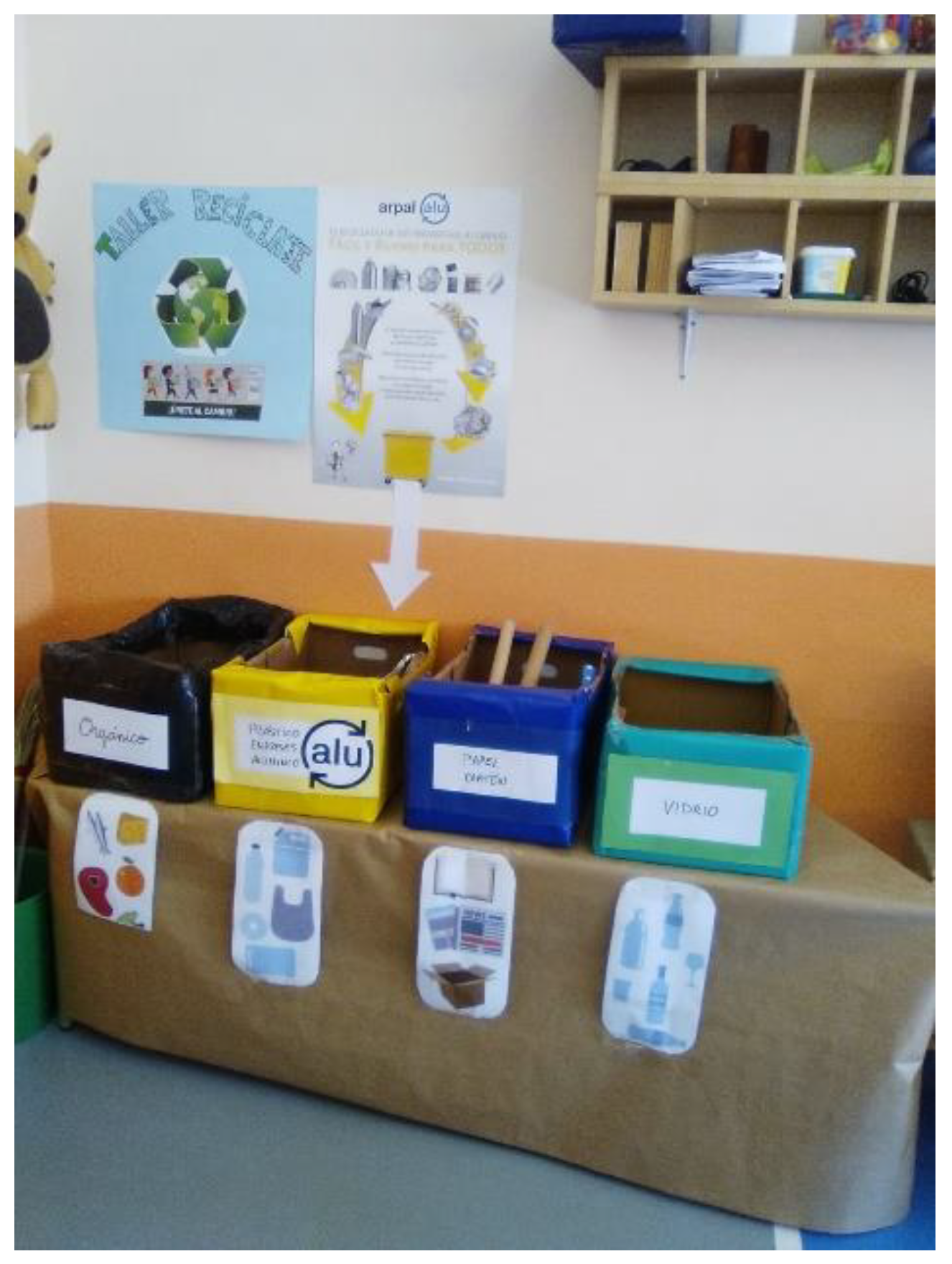
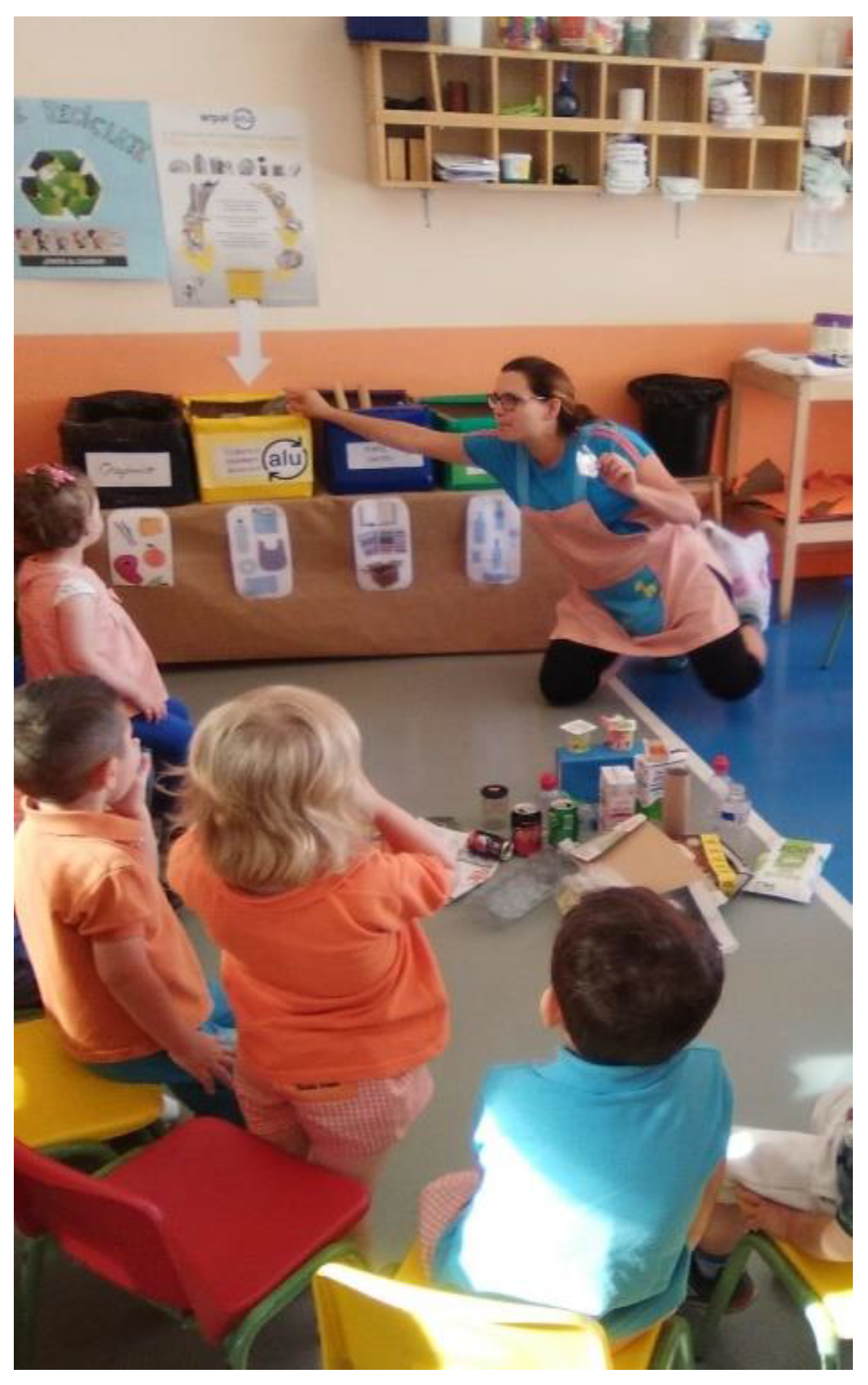
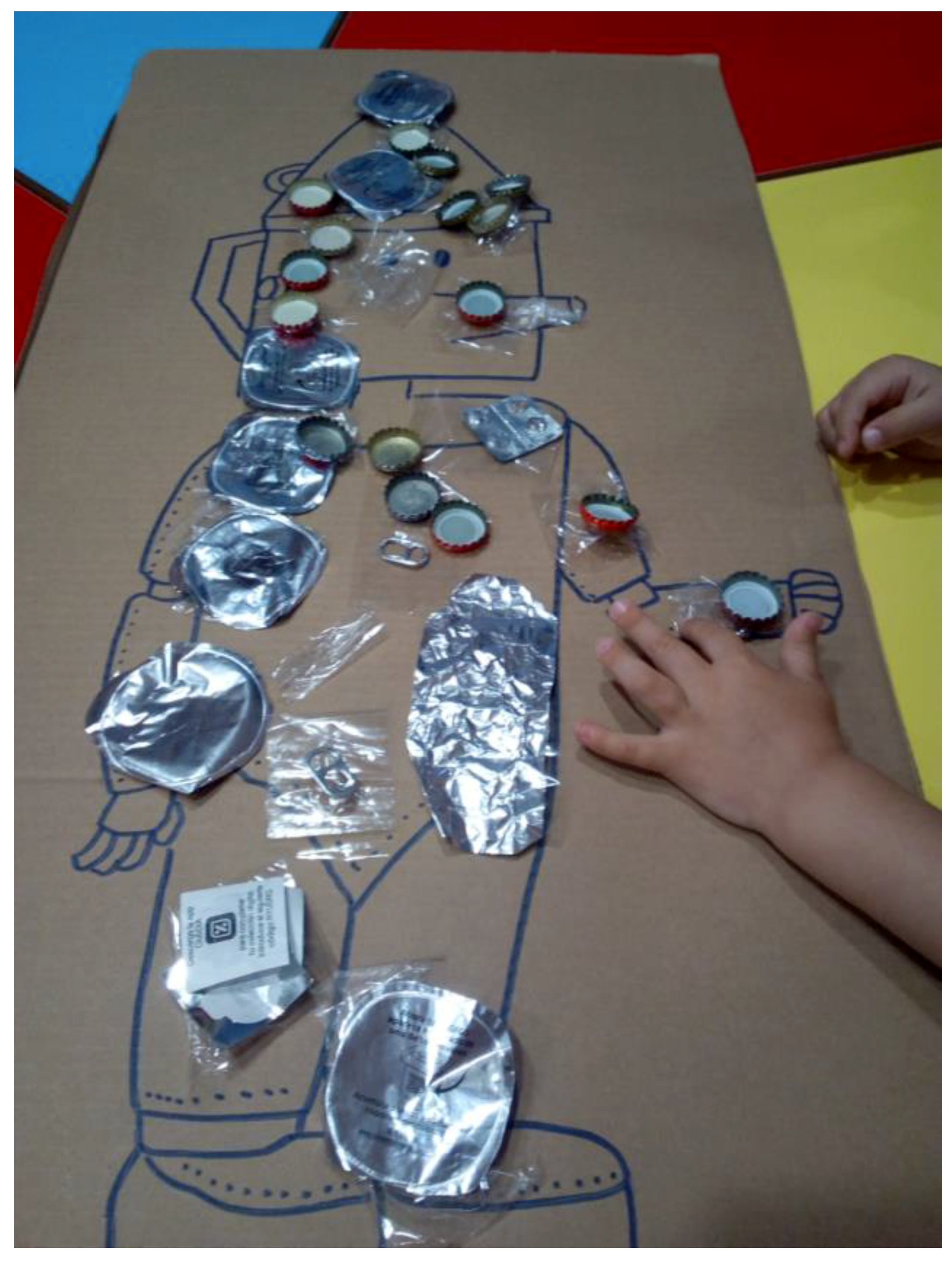
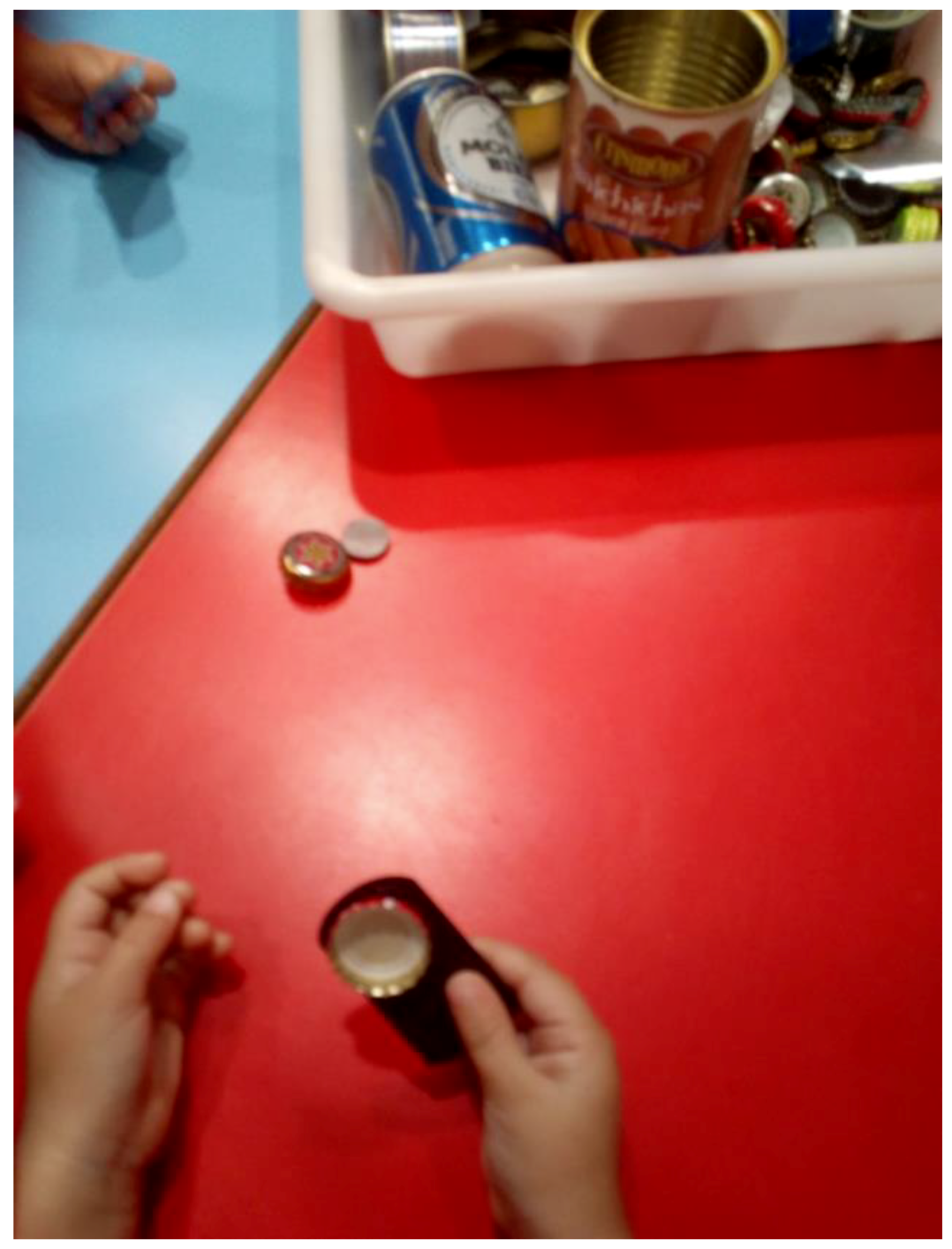
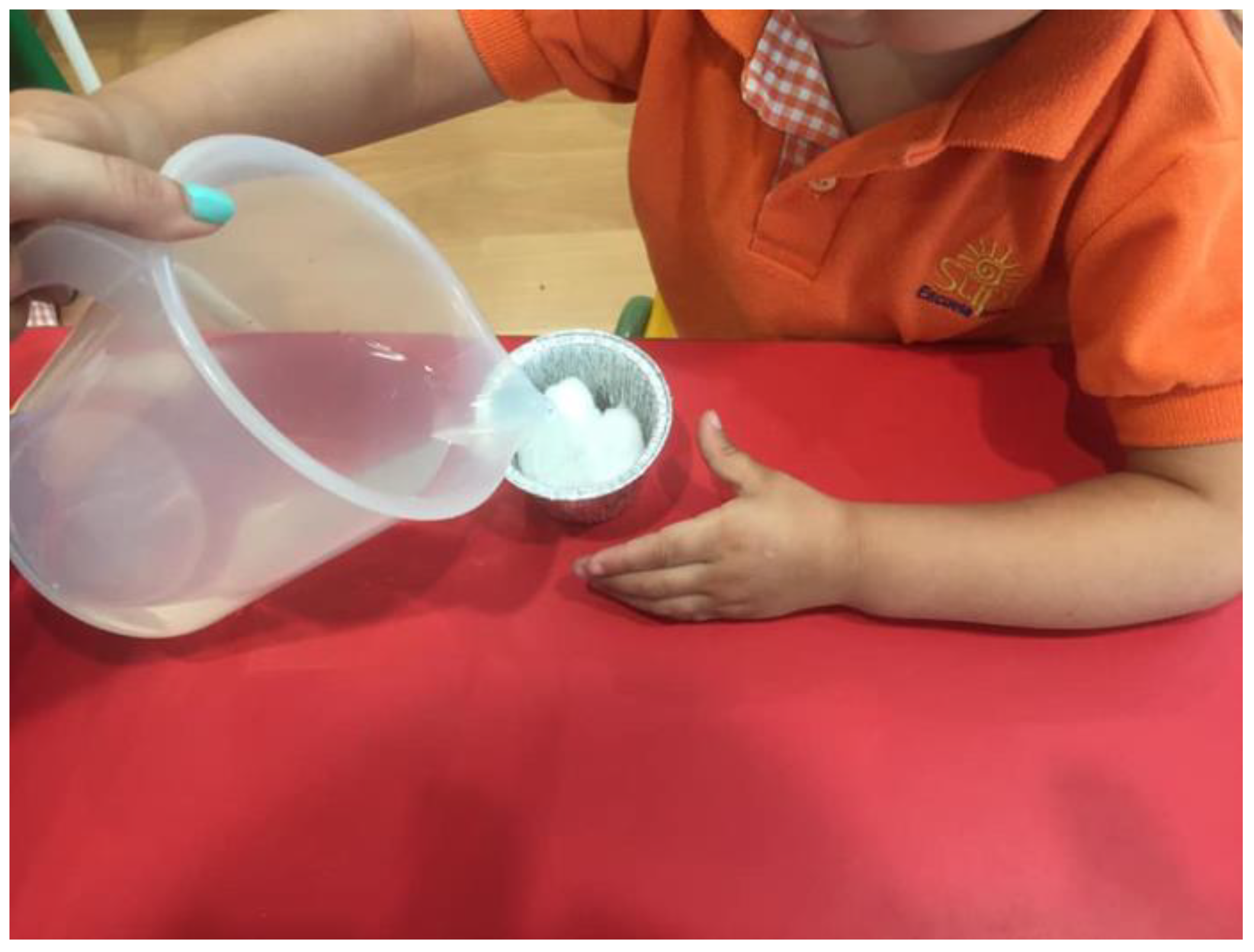
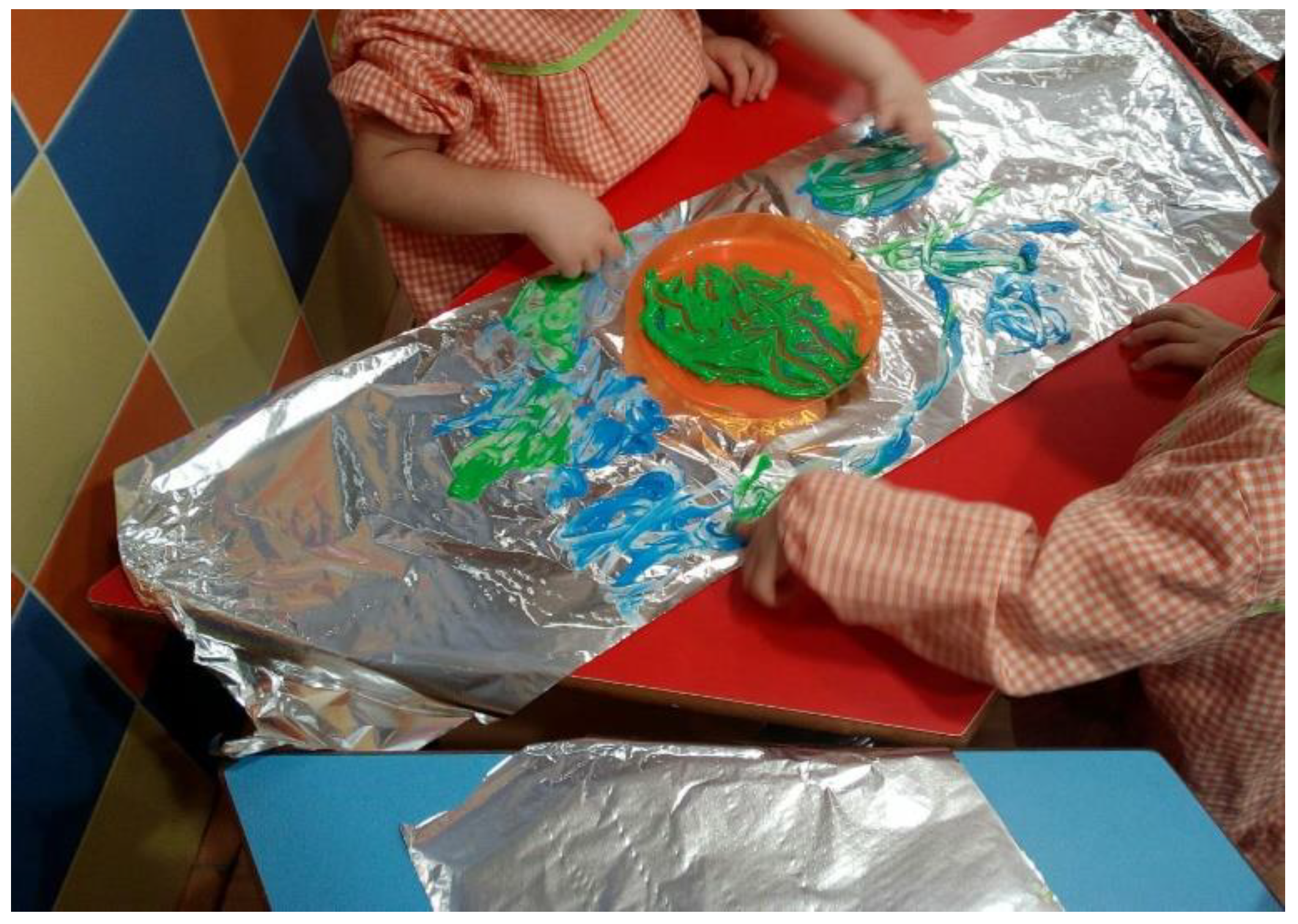
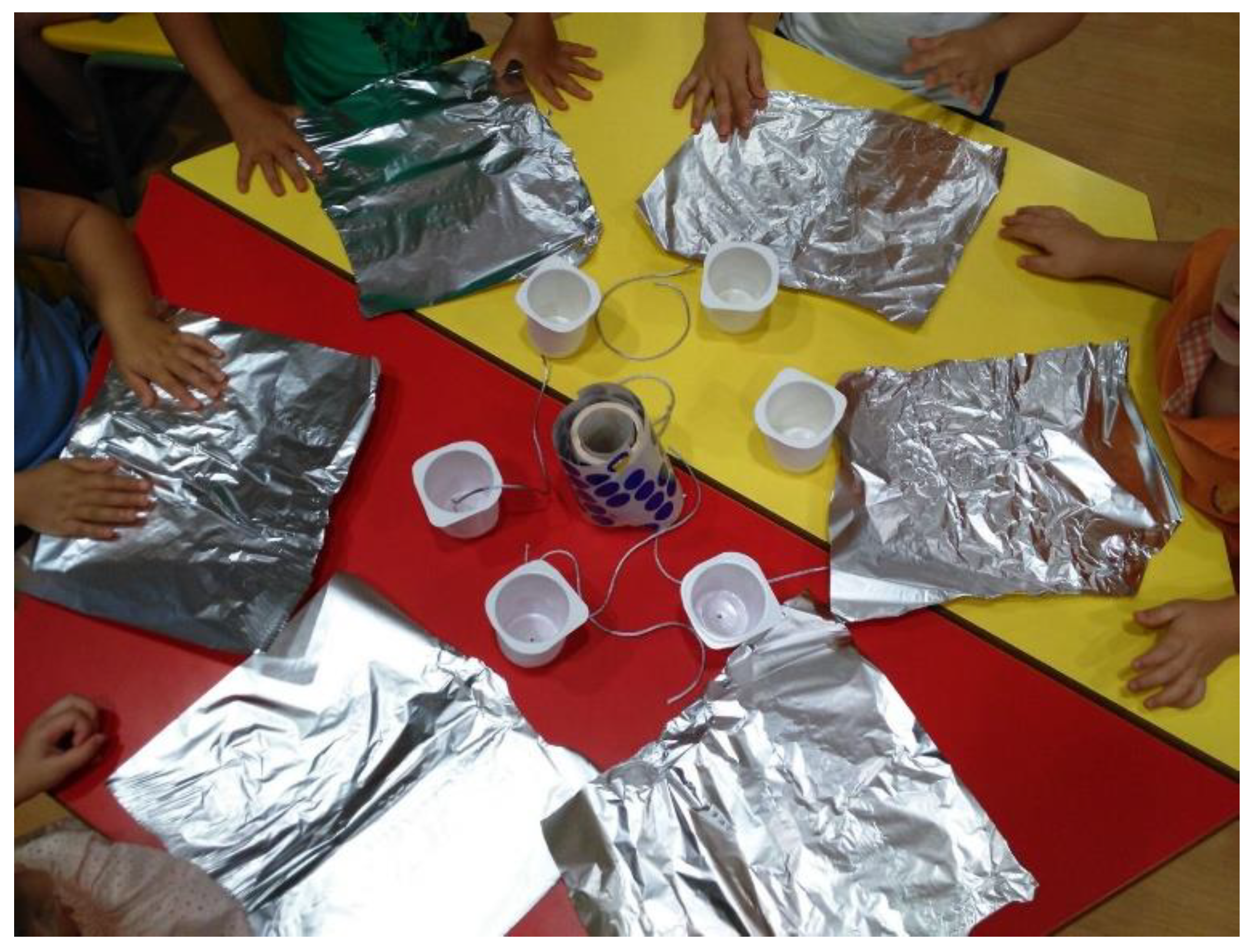
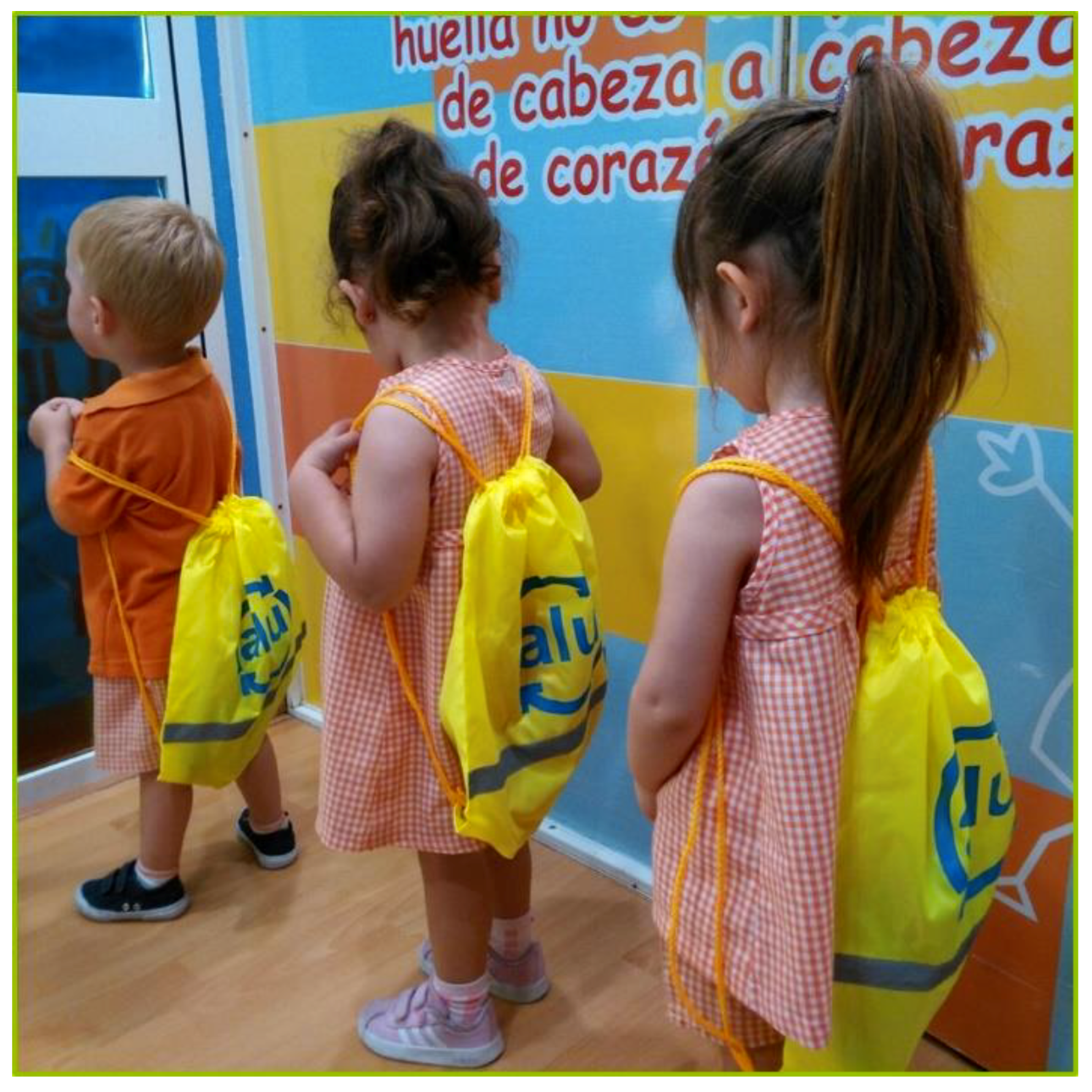
References
- United Nations. The Sustainable Development Goals Report 2016; United Nations: New York, NY, USA, 2016. [Google Scholar]
- World Education Forum. Incheon Declaration and Framework for Action for the Implementation of Sustainable Development Goal 4: Education 2030: Towards Inclusive and Equitable Quality Education and Lifelong Learning for All; UNESCO: Paris, France, 2015. [Google Scholar]
- United Nations. Transforming Our world: the 2030 Agenda for Sustainable Development; United Nations: New York, NY, USA, 2015; Available online: http://tinyurl.com/od9mens (accessed on 13 July 2018).
- Peter, B.C.; Joseph, P.W.; Arjen, E.J.W. Envisioning Futures for Environmental and Sustainability Education; Wageningen Academic Publishers: Wageningen, The Netherlands, 2017. [Google Scholar]
- Hopwood, B.; Mellor, M.; O’Brien, G. Sustainable Development: Maping Different Approaches. Sustain. Dev. 2005, 13, 38–52. [Google Scholar] [CrossRef]
- Fien, J. Education for Sustainability. In Studying Society and Environment. A Guide for Teachers; Robert, G., Ed.; Thomson: South. Melbourne, Australia, 2004; pp. 184–200. [Google Scholar]
- María, A.M.M. Educating for local development and global sustainability: An overview in Spain. Sustainability 2009, 1, 479–493. [Google Scholar] [CrossRef]
- Julie, D.; Sue, E. (Eds.) Research in Early Childhood Education for Sustainability; Routledge: Abingdon/London, UK, 2014. [Google Scholar]
- Bob, G.; Bill, H.; Geoff, O. Environment, economy and society: fitting them together into sustainable development. Sustain. Dev. 2002, 10, 187–196. [Google Scholar]
- Khajuria, A. Resource efficiency: Progress and Challenges of 3Rs technologies and policies. WIT Trans. Ecol. Environ. 2016, 202, 57–60. [Google Scholar]
- Iris, D. Making ‘Place’ for Ecological Sustainability in Early Childhood Education. Environ. Educ. Res. 2012, 18, 19–29. [Google Scholar]
- Davis, J.M. oung Children and the Environment: Early Education for Sustainability; Cambridge University Press: Cambridge, UK, 2015. [Google Scholar]
- Sawitri, D.R. Education for Sustainable Development: How Early is Too Early? Adv. Sci. Lett. 2017, 23, 2559–2560. [Google Scholar] [CrossRef]
- Loubser, C.; Yahya, N.A.; Johann, D.; Abdul, N.A. The effectiveness of environmental education workshops for teachers, learners and schools in Malasya. Environ. Dev. Sustain. 2014, 16, 1163–1176. [Google Scholar] [CrossRef]
- Young, W.; Kumju, H.; McDona, S.; Caroline, J.O. Sustainable consumption: Green consumer behaviour when purchasing products. Sustain. Devel. 2010, 18, 20–31. [Google Scholar] [CrossRef]
- Kollmuss, A.; Julian, A. Mind the Gap: Why do people act environmentally and what are the barriers to pro-environmental behavior? Environ. Educ. Res. 2013, 8, 239–260. [Google Scholar] [CrossRef]
- Chang, Y.J.; Laura, S.; Matthias, F. Assessing Child Development: A Critical Review and the Sustainable Child Development Index (SCDI). Sustainability 2015, 7, 4973–4996. [Google Scholar] [CrossRef]
- Davis, J. Revealing the research ‘hole’ of early childhood education for sustainability: A preliminary survey of the literature. Environ. Educ. Res. 2009, 15, 227–241. [Google Scholar] [CrossRef]
- Somerville, M.; Carolyn, W. Sustainability Education in Early Childhood: An Updated Review of Research in the Field. Contemp Issues Early Child. 2015, 16, 102–117. [Google Scholar] [CrossRef]
- Iliopoulou, I. How young children think they can act for the environment: the case of forest and waste. Education 2018, 46, 249–263. [Google Scholar] [CrossRef]
- Directive (EU) 2018/852 of the European Parliament and of the Council of 30 May 2018 amending Directive 94/62/EC on packaging and packaging waste. Available online: https://eur-lex.europa.eu/eli/dir/2018/852/oj (accessed on 30 September 2018).
- Varela-Losada, M.; Arias-Correa, A.; Pérez-Rodríguez, U.; Vega-Marcote, P. How Can Teachers Be Encouraged to Commit to Sustainability? Evaluation of a Teacher-Training Experience in Spain. Sustainability 2019, 11, 4309. [Google Scholar] [CrossRef]
- Korkmaz, A.; Yildiz, T.G. Assessing preschools using the Eco-Schools program in terms of educating for sustainable development in early childhood education. Eur. Early. Child. Educ. Res. J. 2017, 25, 595–611. [Google Scholar] [CrossRef]
- Svetina, M.; Istenič-Starčič, A.; Juvančič, M.; Novljan, T.; Šubic-Kovač, M.; Verovšek, S.; Zupančič, T. How children come to understand sustainable development: A contribution to educational agenda. Sustain. Dev. 2013, 21, 260–269. [Google Scholar] [CrossRef]
- Pramling, S.I.; Carlsson, M.A. The playing learning child: Towards a pedagogy of early childhood. Scand. J. Educ. Res. 2008, 52, 52–641. [Google Scholar] [CrossRef]
- Pramling, N.; Doverborg, E.; Samuelsson, I.P. Re-metaphorizing Teaching and Learning in Early Childhood Education Beyond the Instruction–Social Fostering Divide. In Nordic Social Pedagogical Approach to Early Years; Charlotte, R., Kragh-Müller, G., Eds.; Springer: Berlin, Germany, 2017. [Google Scholar] [CrossRef]
- Samuelsson, I.P. Why we should begin early with ESD: The role of early childhood education. Int. J. Early. Child. Learn. 2011, 43, 103–118. [Google Scholar] [CrossRef]
- Samuelsson, I.P. What is the future of sustainability in early childhood? In The Sage Handbook of Early Childhood Research; Ann, F., Sharon, L.K., Tisdall, E.K.M., Eds.; Sage: London, UK, 2016; pp. 502–516. [Google Scholar] [CrossRef]
- Taylor, N.; Frances, Q.; Chris, E. Educating for Sustainability in Primary Schools: Teaching for the Future; Sense: Rotterdam, The Netherlands, 2015. [Google Scholar] [CrossRef]
- Pramling Samuelsson, I.; Kaga, Y. The Contribution of early childhood education to a sustainable society. The Role of Early Childhood Education for a Sustainable Society, Göteborg, Sweden, 2007; UNESCO: Paris, France, 2008. [Google Scholar]
- Mackey, G. To know, to decide, to act: The young child’s right to participate in action for the environment. Environ. Educ. Res. 2012, 18, 473–484. [Google Scholar] [CrossRef]
- Boyd, D. Early childhood education for sustainability and the legacies of two pioneering giants. Early Years 2018, 38, 227–239. [Google Scholar] [CrossRef]
- Luff, P. Early childhood education for sustainability: Origins and inspirations in the work of John Dewey. Education 2018, 46, 447–455. [Google Scholar] [CrossRef]
- Edwards, S.; Cutter-Mackenzie, A. ‘Next Time We Can Be Penguins’: Expanding the Concept of ‘Learning Play’ to Support Learning and Teaching about Sustainability in Early Childhood Education. In Varied Perspectives on Play and Learning: Theory and Research on Early Years Education; Ole, F.L., Sue, D., Bob, P., Eds.; Information Age Publishing: Charlotte, NC, USA, 2013; pp. 255–274. [Google Scholar]
- Samuelsson, I.P.; Park, E. How to Educate Children for Sustainable Learning and for a Sustainable World. Int. J. Early. Child. 2017, 49, 273–285. [Google Scholar] [CrossRef]
- MacDonald, M. Early Childhood Education and Sustainability: A Living Curriculum. Child. Educ. 2015, 91, 332–341. [Google Scholar] [CrossRef]
- Chauhan, S.; das, S.R.; Martin, H.; Natalia, R. Awareness vs Intentionality: Exploring Education for Sustainable Development in a British Hindu Community. Sustain. Dev. 2012, 20, 361–373. [Google Scholar] [CrossRef]
- Pollock, K.; Jane, D.W.; Peter, J.A. Inspiring environmentally responsible preschool children through the implementation of the National Quality framework: uncovering what lies between theory and practice. Aus. J. Early Child. 2017, 42, 12–19. [Google Scholar] [CrossRef]
- Hopkins, C.; McKeown, R. Moving Beyond the EE and ESD Disciplinary Debate in Formal Education. J. Educ. Sustain. Dev. 2017, 1, 17–26. [Google Scholar] [CrossRef]
- Kennelly, J.; Neil, T.; Maxwell, T. A student teacher’s personal pathway to education for sustainability. Aust. J. Environ. Educ. 2008, 24, 23–33. [Google Scholar] [CrossRef]
- Hsiao, C.Y.; Pei, Y.S. Exploring the effectiveness of picture books for teaching young children the concepts of environmental protection. Int. Res. Geogr. Environ. Educ. 2016, 25, 36–49. [Google Scholar] [CrossRef]
- Buil-Fabregá, M.; Martínez, C.M.; Ruiz-Munzón, N.; Filho, W.L. Flipped Classroom as an Active Learning Methodology in Sustainable Development Curricula. Sustainability 2019, 11, 4577. [Google Scholar] [CrossRef]
- Ballantyne, R.; John, F.; Jan, P. School environmental education programme impacts upon student and family learning: A case study analysis. Environ. Educ. Res. 2001, 7, 23–37. [Google Scholar] [CrossRef]
- Grodziéska-Jurczak, M.; Anna, S.A.; Katarzyna, N.K.; Bryda, G. Perception of Environmental Problems Among Pre-school Children in Poland. Int. Res. Geogr. Environ. Educ. 2006, 15, 62–76. [Google Scholar] [CrossRef]
- Seidman, I.E. Interviewing as Qualitative Research. A Guide for Researchers in Education and the Social Science; Teachers College Press: New York, NY, USA, 1998. [Google Scholar]
- Siraj-Blatchford, J.; Mogharreban, C.; Park, E. International Research on Education for Sustainable Development in Early Childhood; Springer: Cham, Switzerland, 2016; p. 14. [Google Scholar] [CrossRef]
- Hopkins, C. Scope and Impact of Global Actions under UNDESD. J. Educ. Sustain. Dev. 2014, 8, 113–119. [Google Scholar] [CrossRef]
- Ärlemalm-Hagsér, E.; Sue, E. Special Issue: Contemporary Research on Early Childhood Education for Sustainability. Int. J. Early Child. 2017, 49, 267–272. [Google Scholar] [CrossRef]
- Aznar, M.; Pilar, M.; Martinez-Agut, P.; Belen, P.; Albert, P.; Ull, M.A. Introducing sustainability into university curricula: An indicator and baseline survey of the views of university teachers at the University of Valencia. Environ. Educ. Res. 2011, 145–166. [Google Scholar] [CrossRef]
- Martínez, A.; Pilar, M.; Ull, M.A.; Pilar, A.M. Education for sustainable development in early childhood education in Spain. Evolution, trends and proposals. Eur. Early. Child. Educ. Res. J. 2014, 22, 213–228. [Google Scholar] [CrossRef]
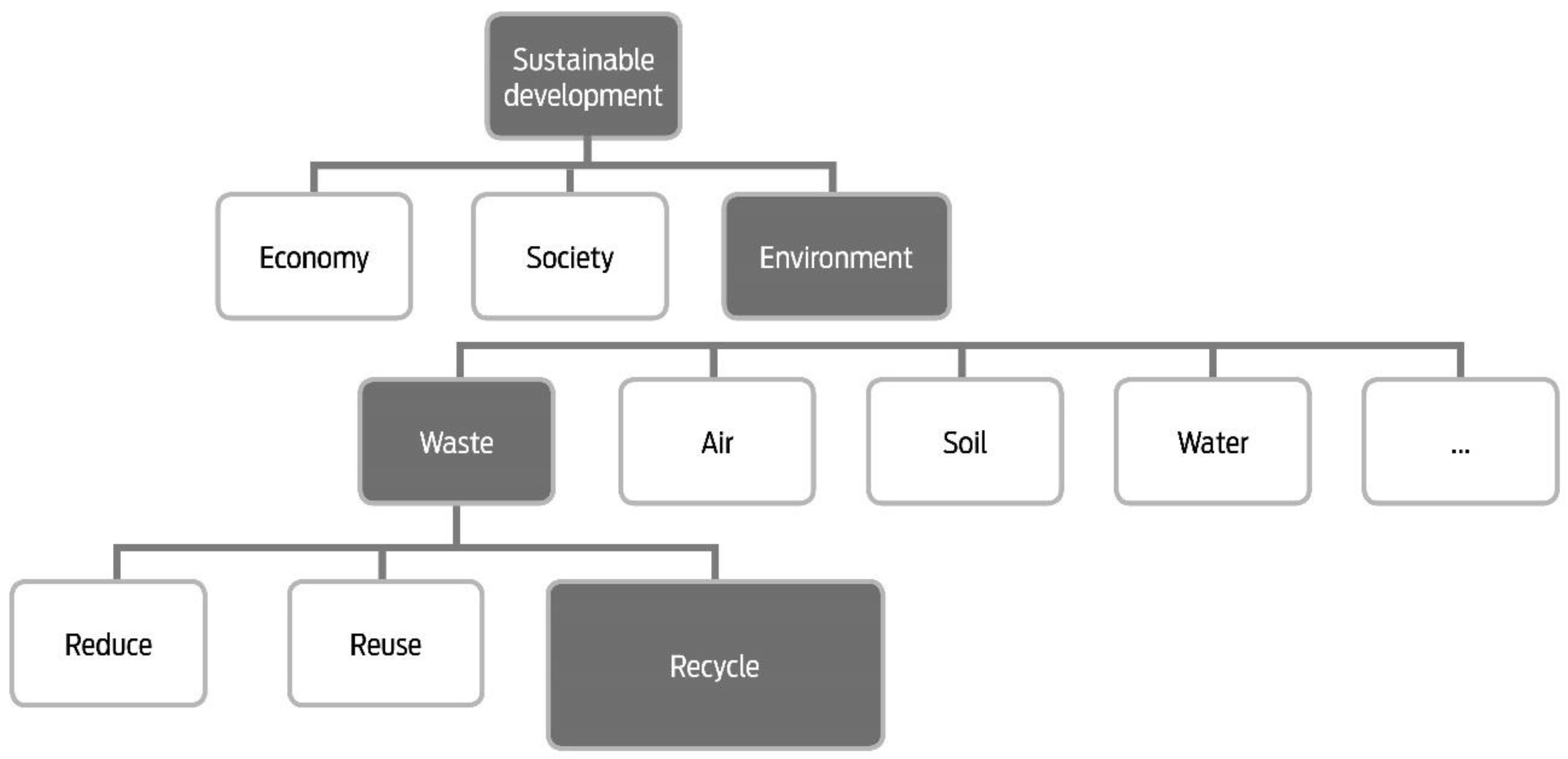
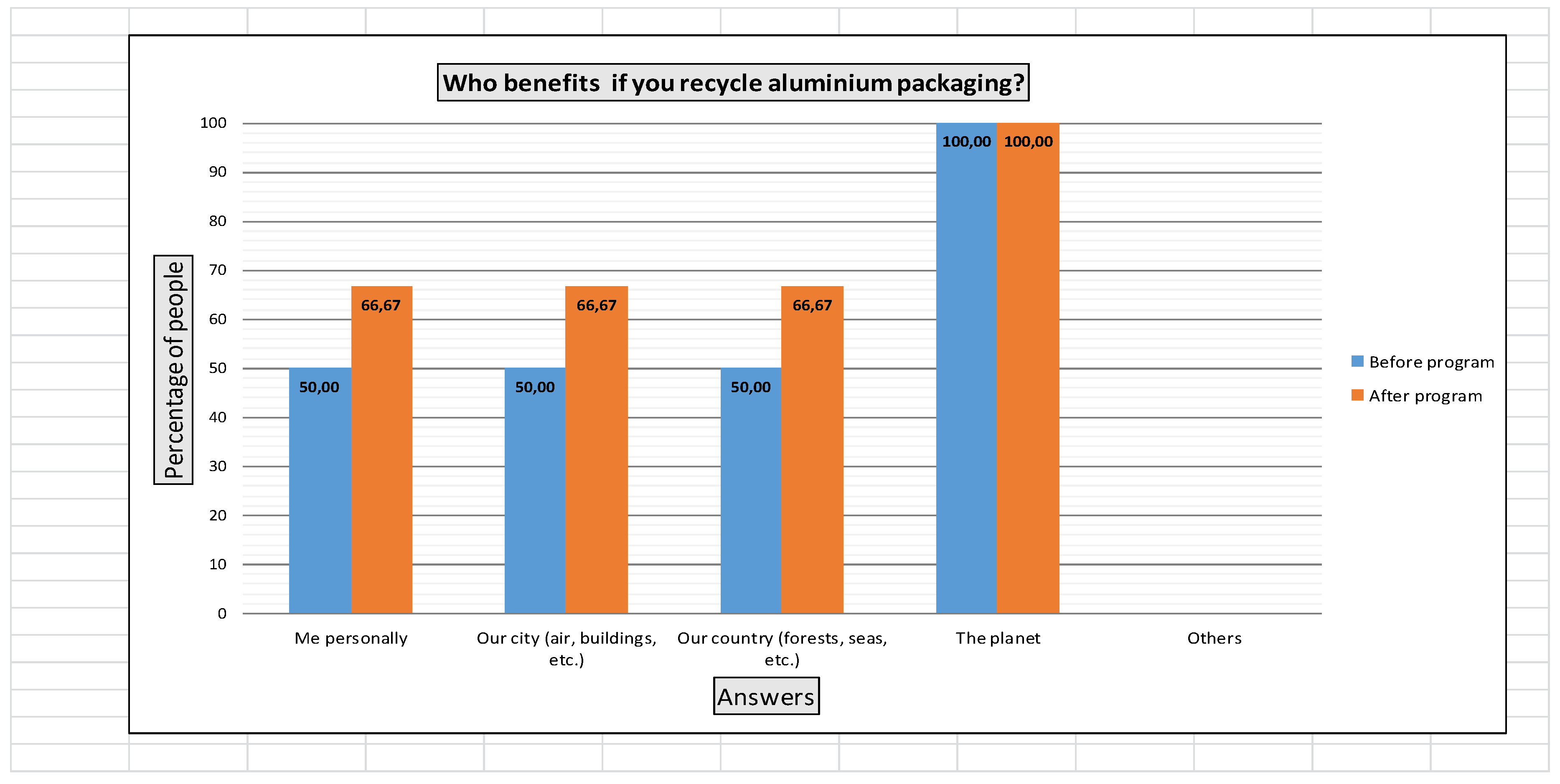
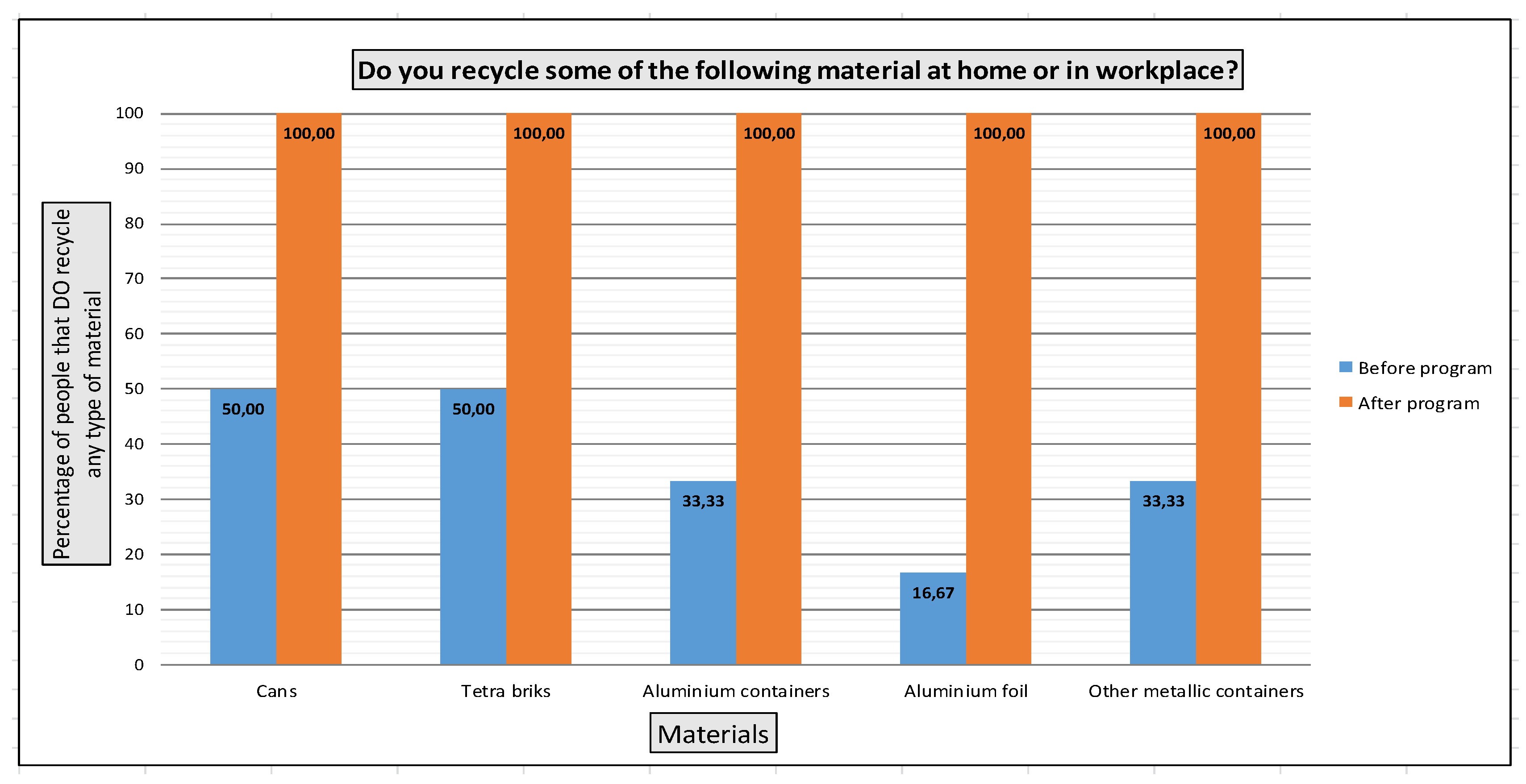
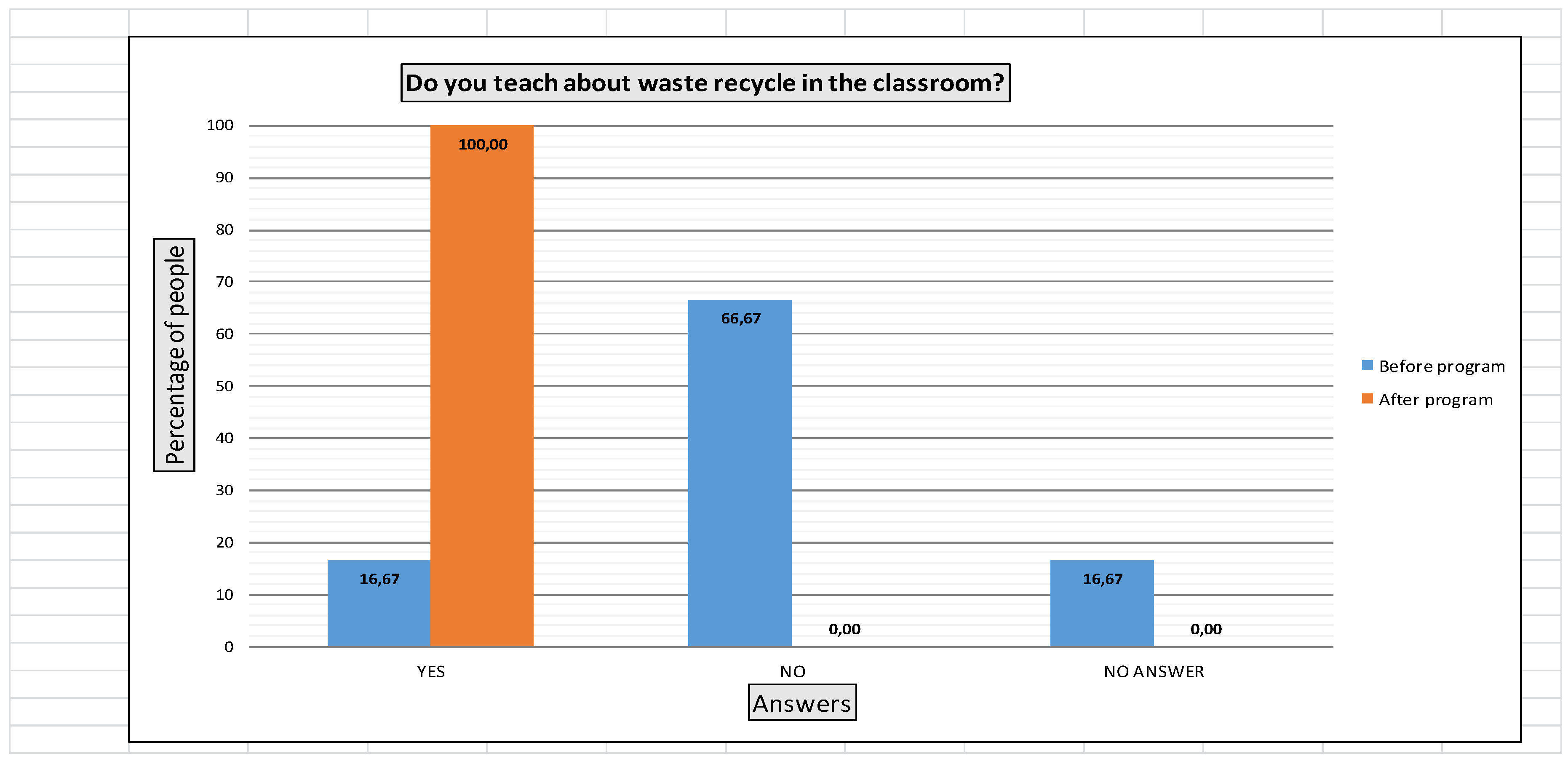
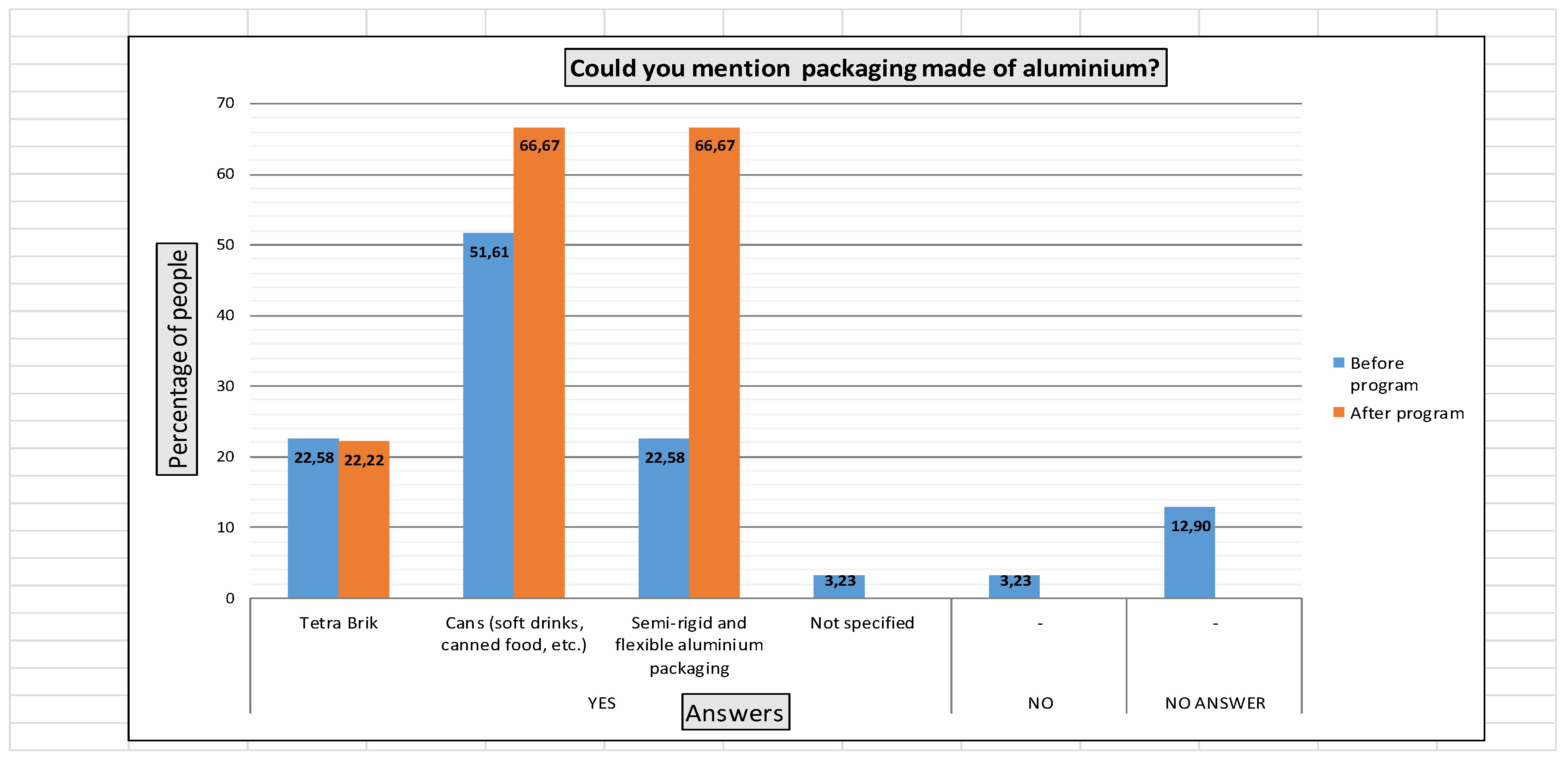
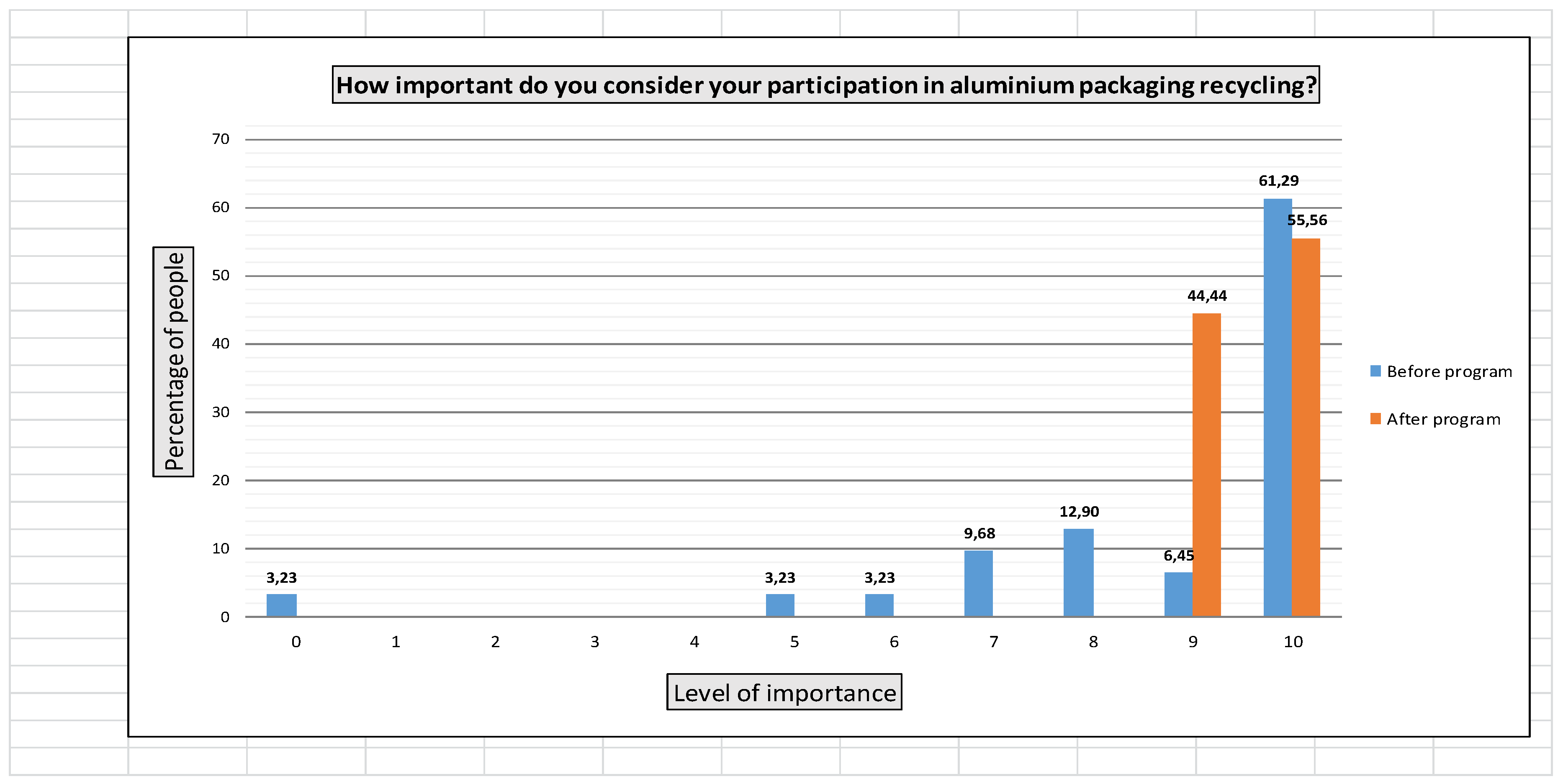
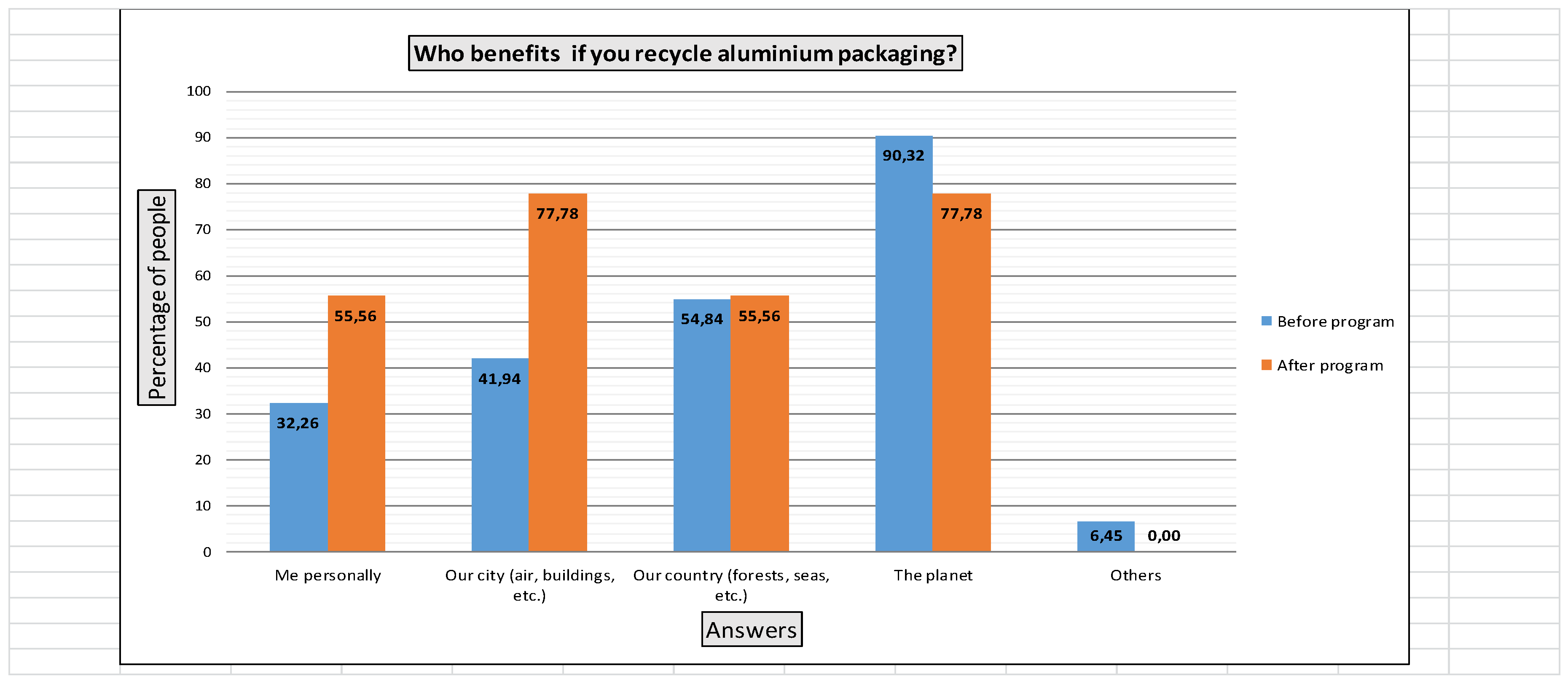
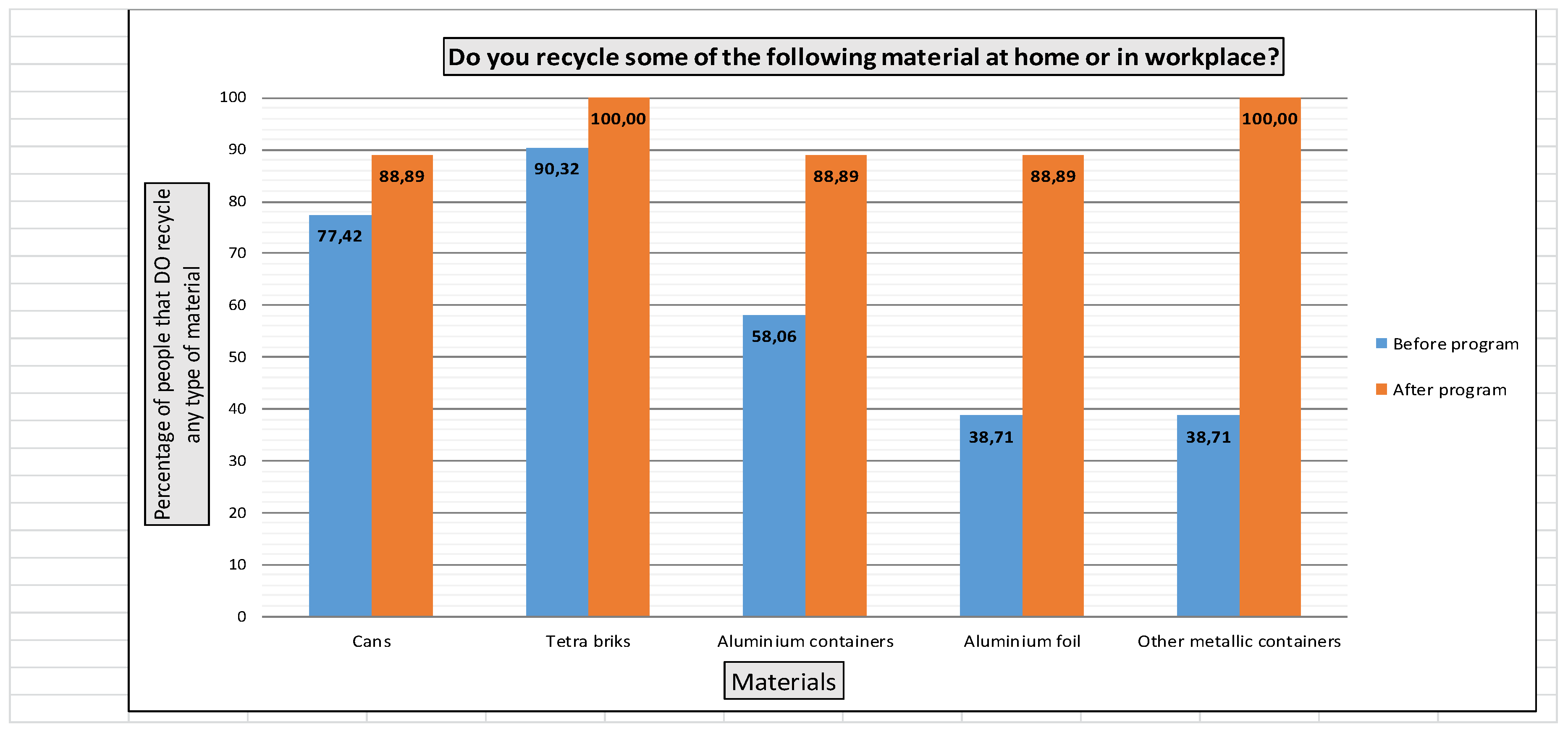
| Day | Active Learning Strategies | Learning Activities |
|---|---|---|
| 1 | Initial activity: talking about recycling in general | Brainstorming Promoting ideas Assembly |
| 2 | Knowledge activity and awareness: talking about colors of containers for recycling and what to throw in each one. Creation of a “Recycling Corner” with boxes and colors. See Figure A1. | Discussions within the class Knowledge through action |
| 3 | Selecting different packaging and throwing it in the right container. See Figure A2. | Classification workshop |
| 4 | Presenting “Wizard of Oz” story; drawing a metal figure and sticking aluminum in it. See Figure A3. | Creative workshop Interacting with their friends |
| 5 | Selecting aluminum and metal packaging with a magnet. See Figure A4. | Experimentation workshop |
| 6 | Out-of-class activities: seeing containers in the street and throwing aluminum packaging in the yellow container. | Experiential visit in collaboration with parents |
| 7 | Creating a flowerpot with aluminum packaging, adding seeds, and watering it. See Figure A5. | Creative and experimentation workshop |
| 8 | Painting and drawing on aluminum foil with different tools (sponge, roller, and brush). See Figure A6. | Art and experimentation workshop |
| 9 | Interacting with their teacher and friends: seeing and touching bauxite stone. | Sensory workshop (observation, manipulation, etc.). |
| 10 | Designing a circuit made of aluminum packaging and other materials such as balls, strings, etc.; imitating characters of “Wizard of Oz” story. See Figure A7. | Dramatization Creative and psychomotor workshop |
| 11 | Out-of-class activity: visit to the recycling center in Sadeco. See Figure A8. | Experiential visit in collaboration with parents |
| 12 | Creating a “hungry hungry hippos” toy and throwing balls made of aluminum packaging. | Creation Gamification Playing |
| 13 | Designing a collar made of aluminum caps. | Art workshop |
| 14 | Interacting with their teacher and friends: puppet show about “Wizard of Oz” story. | Dramatization |
| 15 | Final activity: repeating the initial activities to assess the learning process. | Brainstorming Assembly |
| Steps | Groups Involved | Date | Actions |
|---|---|---|---|
| Cooperation agreement and working plan | Arpal association Supla association | June 2017 September–October 2017 | Meetings Brainstorming Commitment |
| Training of teachers | Seven teachers from Córdoba and Seville and Arpal | November 2017 | Lecture and active session about aluminum packaging and its recyclability |
| Pre- and post-assessment of knowledge, awareness, and actions regarding recycling | Seven teachers | November 2017 | Quantitative: Questionnaire pre- and post-training |
| Design of a teaching unit about aluminum packaging recycling for children under 6 years old | Teachers and Arpal | February–May 2018 | 15 active learning activities involving children, volunteer parents, and the neighborhood |
| Find out the pre-level of knowledge, awareness, and actions regarding recycling | Parents of 54 children in Córdoba and Seville | 1–10 June 2018 | Quantitative: pre-activity questionnaire |
| Implementation of the teaching unit in a pilot test | Two preschools in Córdoba, one in Seville (54 children in total): Centro de Ed Inf Supli Sur (Córdoba), Centro de Ed Inf Supli Levante (Córdoba), and Centro de Ed Inf Supli Sevilla (Seville) | 11–22 June 2018 | Active learning fostering multiple intelligences Observation Parents’ participation |
| Assessment of the pilot test Review of the initial teaching unit and realization of the final teaching unit | Seven teachers | 23 June–7 July 2018 | Observations of teachers/development of activities/observations from parents |
| Assessment of how the program affected the whole family | Parents of 54 children in Córdoba and Seville | 23 June–7 July 2018 9 July 2018 | Quantitative: post-questionnaires and in-depth interview |
| Final assessment of the program and its impact on the preschool community | Teachers and managers | 10 July 2018 | Qualitative: focus group |
| Implementation of the final teaching unit | 29 preschools in Córdoba and the Cádiz region (1300 children) | 7 July 2018 to the end of the month | Active learning fostering multiple intelligences |
© 2019 by the authors. Licensee MDPI, Basel, Switzerland. This article is an open access article distributed under the terms and conditions of the Creative Commons Attribution (CC BY) license (http://creativecommons.org/licenses/by/4.0/).
Share and Cite
Buil, P.; Roger-Loppacher, O.; Tintoré, M. Creating the Habit of Recycling in Early Childhood: A Sustainable Practice in Spain. Sustainability 2019, 11, 6393. https://doi.org/10.3390/su11226393
Buil P, Roger-Loppacher O, Tintoré M. Creating the Habit of Recycling in Early Childhood: A Sustainable Practice in Spain. Sustainability. 2019; 11(22):6393. https://doi.org/10.3390/su11226393
Chicago/Turabian StyleBuil, Pilar, Olga Roger-Loppacher, and Mireia Tintoré. 2019. "Creating the Habit of Recycling in Early Childhood: A Sustainable Practice in Spain" Sustainability 11, no. 22: 6393. https://doi.org/10.3390/su11226393
APA StyleBuil, P., Roger-Loppacher, O., & Tintoré, M. (2019). Creating the Habit of Recycling in Early Childhood: A Sustainable Practice in Spain. Sustainability, 11(22), 6393. https://doi.org/10.3390/su11226393






